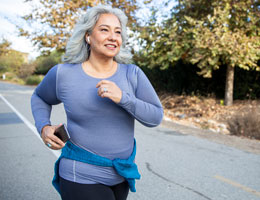
Dec. 15, 2020—If you're someone who needs a cup of coffee or tea to get going in the morning, you're in good company. Many people—not just in the U.S. but all over the world—use caffeine to help themselves get energized.
But that morning pick-me-up can come with a crash later in the day. One minute you're alert, and the next you're sluggish and in need of your next caffeine fix.
If you want to get off the caffeine rollercoaster, here's some good news: There are natural ways to get the energy you need to charge through your day. Try a few of these tips, from experts at the National Institutes of Health (NIH) and others:
Tuck in on time. Most adults need between seven and eight hours of sleep per night, according to the NIH. If you're in bed for that long but you still don't feel rested in the morning, you may have a sleeping disorder, like sleep apnea. Talk with your doctor about next steps.
Get a move on. Regular exercise is a great gateway to better sleep and more energy. Aim for at least 150 minutes of moderately intense aerobic activity each week. If you haven't been physically active, start slowly. Then gradually work your way up to longer or more vigorous workouts. For an instant pick-me-up, go for a 10-minute walk when you're feeling sluggish in the middle of the day.
Have a bite. A quick, nutritious snack can boost your blood sugar levels and give you a lift during the day. But avoid high-calorie energy bars and candy—their energy often comes from caffeine and sugar. Opt for fruits, veggies and fiber-rich foods instead.
Sub a better sip. Drinking plenty of water during the day can help you fight off energy-sapping dehydration. Staying hydrated helps you stay alert.
Watch your weight. Carrying around extra pounds can be tiresome for your body. And it puts an extra load on your heart. If needed, getting more exercise and eating healthfully can help you get to a healthier weight.
Manage your mental health. Nothing saps your energy like being stressed-out or depressed. And it can lead to unhealthy coping behaviors like smoking, drinking alcohol and overeating. Talk with a doctor or a counselor if you need help getting into a better mind-set.
How much coffee is too much coffee? See the answer.